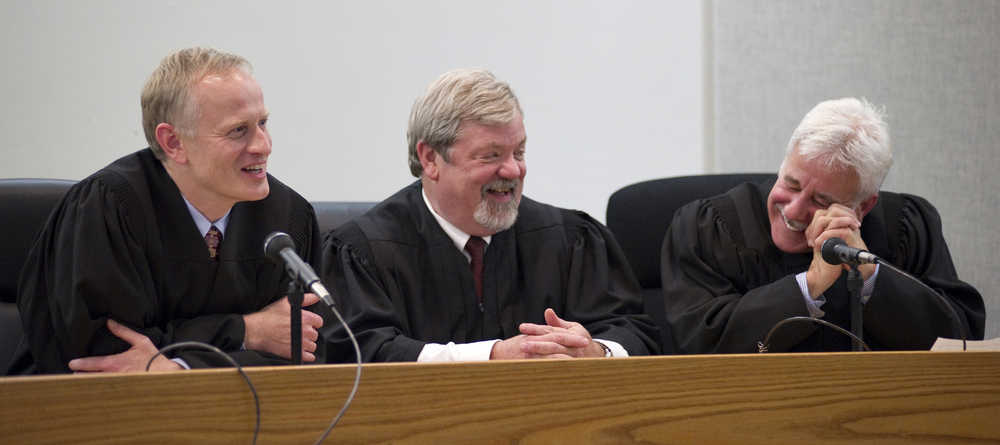Juneau Superior Court Judge Philip Pallenberg is trying again for the honor of serving on the Alaska Supreme Court.
The capital city justice is among eight applicants for the vacancy created by the upcoming retirement of Justice Dana Fabe, the Alaska Judicial Council announced Friday afternoon.
Pallenberg previously applied for the court in 2012, when Chief Justice Walter Carpeneti announced his retirement. Three years ago, Pallenberg was among 13 applicants seeking the position, which went to Joel Bolger, an Alaska Court of Appeals judge.
“Basically, I’ve been on the bench 15 years, and I think I’d enjoy new challenges,” Pallenberg said about his reasons for applying again. “I think I’d enjoy it; I think I’d be good at it.”
Under Article 4, Section 8 of the Alaska Constitution, a seven-member judicial council vets applicants for judgeships and forwards a list of recommended finalists to the governor for final selection. In this case, the selection is expected to take place before June, when Fabe is scheduled to retire.
Pallenberg came to Juneau in 1983 after graduating from the University of Washington Law School. He served as an assistant public defender in Juneau and Kodiak for eight years and was in private law practice in Juneau for 15 years. He served as a part-time U.S. Magistrate Judge from 2000 to 2007 and was appointed as a Juneau Superior Court Judge by Gov. Sarah Palin in August 2007.
Pallenberg said that if selected, he thinks he would enjoy the opportunity to deliberate with a group. “I think the work of a superior court judge, a trial court judge, it’s kind of solitary work,” he said.
On the Alaska Supreme Court, he would be one of five decision-makers.
Since Carpeneti’s retirement in 2012, the Supreme Court has been without a representative from Southeast Alaska, and Pallenberg said he thinks that should be rectified. “I think it’s important that there be representation from Southeast Alaska on the supreme court,” he said.
If geographical distribution turns out to be a deciding factor, Pallenberg would be competing with David Voluck on those grounds.
Voluck, based in Sitka, has lived in Alaska for 17 years, arriving not long after he graduated from Northwestern School of Law in 1995.
Voluck is known particularly for his tribal court work. He served as a magistrate in the Tlingit and Haida Central Council tribal court, chief judge of the Sitka Tribal Court, and in 2012 he was appointed a judge for the tribal court of the Aleut Community of St. Paul Island Tribal Government.
He also is co-author (with David Case) of the latest edition of the definitive legal work, “Alaska Natives and American Laws.”
The other six applicants:
• Kevin Clarkson, a 30-year Alaska resident and private practice attorney in Anchorage,
• Andrew Guidi, a 33-year Alaska resident and Anchorage superior court judge,
• Jahna Lindemuth, a 43-year Alaska resident and private practice attorney in Anchorage best known for her work defending the Fairbanks Four,
• Ruth Botstein, a 17-year Alaska resident and Anchorage inhabitant specializing in appellate work as an assistant attorney general,
• Susan Carney, a 28-year Alaska resident and a supervising public attorney for the Office of Public Advocacy in Fairbanks,
• Paul Roetman, a 43-year Alaska resident and a superior court judge in Kotzebue.
All eight candidates will be subjected to an anonymous survey of licensed Alaska attorneys, who will be asked to grade the eight on their skills and demeanor in the courtroom.
“It’s intimidating to put yourself out there,” Pallenberg said of the experience.
“There’s always some amount of trepidation when you put your name out there and ask people what they really think,” Botstein said.
In addition to the surveys, the judicial council will conduct interviews with, and background checks of, the eight candidates.
Finalists will be selected at a public meeting in Anchorage, and the governor will have 45 days from that meeting to make his selection.
“I think the merit selection process Alaska has is the best way,” Botstein said. “I think it will lead to a good outcome.”

